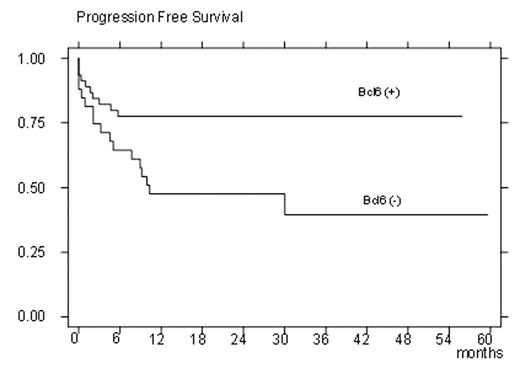Abstract
Bcl-2 and Bcl-6 protein expression has been reported to predict progression-free (PFS) and overall (OS) survival of patients with Diffuse Large B-cell Lymphoma (DLBCL) in retrospective and prospective clinical studies. Reports on Bcl-2 expression frequency and predictive value have been conflicting. In the current study, paraffin-embedded tissue specimens from 79 newly diagnosed DLBCL patients subsequently treated with CHOP-like chemotherapy without rituximab were studied retrospectively using immunohistochemistry to evaluate expected influence of Bcl-2 and Bcl-6 on clinical outcome. Bcl-2 and Bcl-6 positivity was defined as staining in any of lymphoma cells and it was demonstrated in 78% of Bcl-2 and 58% of Bcl-6 patients. Frequency of Bcl-2 protein expression in our study was much higher then reported by others. Combinations of possible positive/negative staining results: Bcl2+/Bcl6+, Bcl-2+/Bcl-6-, Bcl-2-/Bcl-6+, Bcl-2-/Bcl-6- were found in 46%, 33%, 13%, and 9% of cases, respectively. Complete remission (CR) after initial chemotherapy was achieved in 54 of 74 evaluable patients (73%) and 6 patients (8%) had progressive disease (PD). CR rate was higher and relapse and death rate was lower in patients with Bcl-6+ tumor irrespective of Bcl-2 status. In patients with Bcl-6 negative lymphoma CR rate was higher when Bcl-2 was positive, but relapse and death rate was not affected by Bcl-2. Median OS and PFS were not reached after 21.3 months of follow-up in this group of patients. In the analysis using multivariate proportional hazards regression model, advanced clinical stage (CS III and IV vs. CS I and II) was the only significant factor predicting OS (p<0.002). Risk of relapse or PD was significantly lower in patients with IPI score of 0 or 1 vs. > 1 (p<0.001), and in patients with both Bcl-2 and Bcl-6 positive lymphoma (p=0.04) as compared to patients with all other protein expression combinations. When analyzed separately, Bcl-6 positivity alone predicted PFS (p=0.025) while Bcl-2 was not significant (p=0.98). These results support predictive value of Bcl-6 protein expression for response to CHOP and PFS in DLBCL patients and are in agreement with the recent findings from the E4494 trial group (
Author notes
Corresponding author


This feature is available to Subscribers Only
Sign In or Create an Account Close Modal